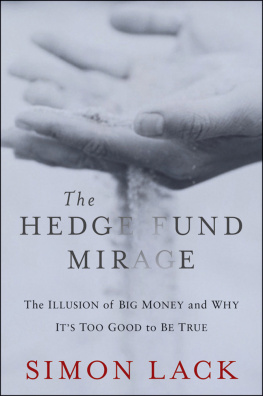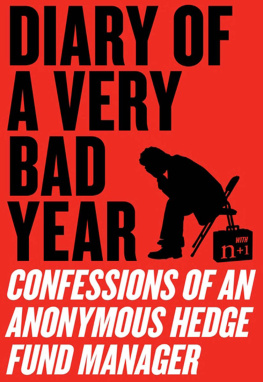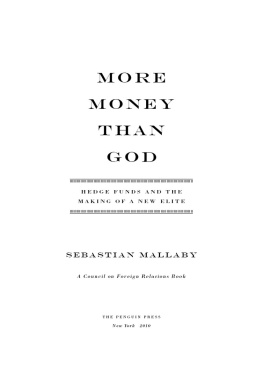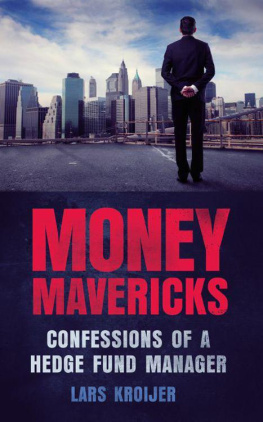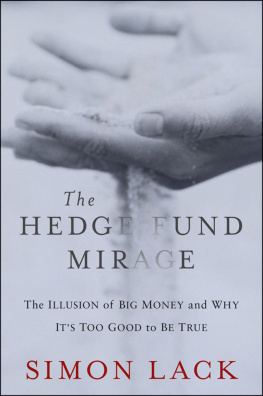Thank you for buying this ebook, published by NYU Press.
Sign up for our e-newsletters to receive information about forthcoming books, special discounts, and more!
Sign Up!
About NYU Press
A publisher of original scholarship since its founding in 1916, New York University Press Produces more than 100 new books each year, with a backlist of 3,000 titles in print. Working across the humanities and social sciences, NYU Press has award-winning lists in sociology, law, cultural and American studies, religion, American history, anthropology, politics, criminology, media and communication, literary studies, and psychology.
MONEY AT WORK
MONEY AT WORK
On the Job with Priests, Poker Players, and Hedge Fund Traders
Kevin J. Delaney
NEW YORK UNIVERSITY PRESS
New York and London
www.nyupress.org
2012 by New York University
All rights reserved
References to Internet websites (URLs) were accurate at the time of writing. Neither the author nor New York University Press is responsible for URLs that may have expired or changed since the manuscript was prepared.
Library of Congress Cataloging-in-Publication Data
Delaney, Kevin J., 1960
Money at work: on the job with priests, poker players, and hedge fund traders / Kevin J. Delaney.
p. cm.
Includes bibliographical references and index.
ISBN 978-0-8147-2080-6 (cl: alk. paper)
ISBN 978-0-8147-3807-8 (ebook)
ISBN 978-0-8147-6966-9 (ebook)
1. Hedge funds. 2. Fund raising. 3. Money. I. Title.
HG4530.D417 2012
331.793--dc23 2011052280
New York University Press books are printed on acid-free paper, and their binding materials are chosen for strength and durability. We strive to use environmentally responsible suppliers and materials to the greatest extent possible in publishing our books.
Manufactured in the United States of America
10 9 8 7 6 5 4 3 2 1
ACKNOWLEDGMENTS
Since this book makes the point that work shapes who we are, it is tempting to blame all my colleagues for what they have wrought. Instead, I will thank them for their help. I have had support over the years from everyone at Temple University, particularly those with whom I work in the Sociology Department and in the College of Liberal Arts Deans Office. Susan Herbst, Phil Alperson, Carolyn Adams, and Teresa Soufas have all been supportive deans and great colleagues. Provosts Lisa Staiano-Coico and Richard Englert and university presidents David Adamany and Ann Weaver Hart have been leaders who value faculty research. As evidence of their commitment, this book was aided by a summer research fellowship from Temple University. My longtime colleagues Gretchen Condran and Julia Ericksen have always been available to talk about the big ideas, and Judith Levine pointed me toward several new sources of ideas. The staff at NYU Press, particularly Ilene Kalish, Aiden Amos, and Despina Papazoglou Gimbel helped nurture this book at each step along the way.
I owe gratitude to my colleagues in the field of economic sociology as their ideas and insights inspired this book. The work of Viviana Zelizer and Donald MacKenzie has been particularly important in this regard, and Mark Granovetter and Michael Schwartz have provided me with their intellectual insights for many years. Rich Joslyn, Joe McLaughlin, and Miles Orvell suggested references from outside my own field of study, while Michelle Byng, Mitch Telsey, Daud Watts, and Chris Zuech all shared their networks into particular occupations that I wished to study. Rebecca Alpert and Khalid Blankinship gave me preliminary guidance on some areas of religion with which I was less familiar, and Jared Peifer and Kelly Feighan provided comments on drafts of chapters. Nicole Finnie and Martine Quinn helped transcribe some interviews, and Faye Richardson provided a daily model of strength and dedication. The Delaney and Korman families have always supported me. Susan Korman helped in so many ways, and Rick Eckstein provided the needed diversions.
I give special thanks to all the people who granted me interviews for this book and provided access to their seminars, conferences, and retreats. They were patient with my attempts to figure out a way to study money in their line of work, they talked with me for long periods of time, and they allowed me to hang out and watch them work. The book would not exist without their cooperation and faith in the project.
INTRODUCTION
Thinking about Money
In one way or another, I have been thinking about the issues in this book since I was a young child. I grew up in a rather large working-class family (five children, two parents), and money was always tight. Adding to the money pressures of raising five children was the fact that my mother was viewed by her own parents as marrying down when she chose my father. My maternal grandparents worried that my father would not be able to support a family. Reacting to this and to the actual material circumstances of his life, my father became determined to prove to his in-laws (and to the world) that he could have a large family and support them financially. My father had a high school education and a rather poorly paying job with a municipal water district. Yet my parents were committed to sending all five children to Catholic schools, which meant steady and continuous tuition payments for multiple children at any given time. To supplement his earnings at his primary job, my father began taking on additional jobs. He worked as a golf caddy at a country club on weekends and later began working nights as a valet car parker at the same country club. At some points during my childhood, my father actually held down four different jobs: his main job at the water district, caddying on weekends, parking cars at night, and detailing cars at the country club in whatever time was left over. As a result, we children saw my father only two weeknights per week (and no weekends at all, typically). My mother, for her part, also worked very hard at home raising our family and trying to make ends meet on the income my father brought into the house.
This meant that money was often very tangible for me as a child. My father would arrive home very late at night from the country club (around 2 a.m. typically), and he would leave a stack of dollar bills on the table (as he was paid solely in tips at his night job). Early the next morning, he would get up for work for his regular job, and sometimes the rest of us would be up having breakfast. I remember watching my father count out the dollar bills into separate smaller stacks as my mother verbally recited, almost as if counting along with him, Johns school shoes, Kevins sneakers, Sharons school clothes, the washing machine repair bill.... My fathers chest seemed to puff out if the stacks were large enough, but there would be palpable tension and significant anxiety if the familys needs were larger than the stacks of bills.
Interestingly, and perhaps not surprisingly, most of my own research has centered on money and financeand in this way, one could say that the relationship between money and work, the subject at the heart of this book, reaches down from one generation to the next. I have always had an interest in reading about money and related financial matters. Among the thousands of books about money, one commonly finds accounts of money that can align with the one I share herenamely, that events in childhood shape our relationship to money in adulthood. However, as I have grown into an adult and experienced some social mobility and engaged in many different types of work, I have noticed that my own views of money often changed as a result of the work I was doing. In other words, attitudes toward money are not simply set in childhood but rather evolve throughout ones life. For me, it has often been the workplace where I have learned new things about money and where I would find my attitudes toward money changing. For example, when I worked as a highway toll collector, I began to think about money in a very concrete way. I would have thousands of interactions each day with people who handed me dollar bills (this was before the invention of EZ-Pass). I was amazed at how much time toll collectors spent talking to each other about various schemes and scams (both actual and imagined) for stealing money. But I also noticed that they spent almost as much time telling stories about legendary toll collectors from the past who had been caught in these various schemes. I came to believe that these stories were told because we were around so much cash all the time




